Editor:
Brandon Sweet
University Communications
bulletin@uwaterloo.ca
Remembering Professor Tom Coleman

Professor Tom Coleman during his tenure as Dean of Mathematics with members of a University of Waterloo delegation ringing the opening bell at the New York Stock Exchange in 2005.
A message from the Faculty of Mathematics.

Tom Coleman, dean of Math from 2005 to 2010, and professor of Combinatorics & Optimization from 2005 to the present, passed away on April 20, 2021, after a battle with cancer. He was at home and surrounded by his family, including his loving wife Yuying Li, professor in the Cheriton School of Computer Science.
Thomas Coleman was born in Montreal, QC in 1950. He earned his Ph.D. from the University of Waterloo in 1979. After a two-year post-doctoral fellowship at Argonne National Laboratory in Chicago, Tom was a professor of Computer Science at Cornell University from 1981 to 2005. He returned to Waterloo in 2005, holding the position of Dean of the Faculty of Mathematics from 2005 to 2010. More recently, Professor Coleman held the Ophelia Lazaridis University Research Chair in the Department of Combinatorics and Optimization, as well as being the director of the Waterloo Research Institute in Insurance, Securities and Quantitative Finance (WATRISQ).
Tom Coleman had a very prolific research career, spanning the fields of development of computational methods and tools for compute-intensive and challenging problems with emphasis on applications and computing methodologies such as automatic differentiation and cluster computing technologies. His most well-known work was based on fundamental design and analysis of algorithms for trust-region methods in optimization. These trust-region algorithms have been implemented in the Matlab "fmincon" function, which is used by thousands of Matlab programmers every day. Tom was also the principal developer of the Matlab ADMAT automatic differentiation toolbox.
Tom was the driving force behind setting up an outpost of the Cornell Theory Centre, CTC-Manhattan, at 55 Broad Street in Manhattan, just around the corner from the NYSE. Tom, accompanied by UWaterloo President David Johnston, then-chancellor Mike Lazaridis, and former chair of Waterloo's Board of Governors Bob Harding, rang the opening bell of the New York Stock Exchange on November 18, 2005.
In recognition of his many research accomplishments, Professor Coleman was selected as a SIAM Fellow in 2016.
Coleman was the author of three books on computational mathematics and published over eighty journal articles in the areas of optimization, automatic differentiation, parallel computing, computational finance, and optimization applications.
Professor Coleman was instrumental in establishing the Global Risk Institute for Financial Services (GRI) in Toronto in 2011. GRI was set up at the urging of Mark Carney (former Governor of the Bank of Canada) after the financial crisis of 2008. Tom was appointed the first Chief Research Officer of GRI in 2015.
Tom will be greatly missed by his students, former and present, colleagues and friends.
A private family funeral service will be held at the funeral home on Monday, April 26 at 10:00 a.m. Family and friends are invited to view the livestream and recording of the funeral service at https://www.erbgood.com, at the top of Tom’s obituary page. Read the CaringBridge journal entry for Tom.
Condolences for the family and donations to Grand River Hospital Foundation - Cancer Centre may be arranged by contacting the funeral home at www.erbgood.com or 519-745-8445.
Note: A legacy article about Professor Tom Coleman is now available on Waterloo News.
John Dick named Concept's interim director
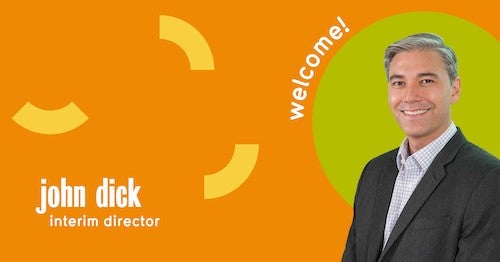
A message from Concept by Velocity.
Greek philosopher Heraclitus once stated, “the only constant in life is change” and this past year has proved it to be true. As can be expected from an innovative unit at University of Waterloo, Concept wholeheartedly accepts and embraces change and is extremely excited to fill you in on a new addition to the Concept Team. We recently welcomed a fresh face with a wealth of entrepreneurial experience to the role of Concept Interim Director, John Dick.
John has been with Concept and Velocity since November 2020, and recently stepped into a new role as Interim Director, bringing with him a wealth of experience and an exciting vision for the future. Now that you know the name, we’d like to introduce you to the person behind it. We sat down with John to ask him about entrepreneurship and innovation at the University of Waterloo and how he sees Concept making meaningful impacts for students. Learn more about his experience founding Nicoya Lifesciences, as well as his vision and plans for the future of student innovation and some exciting opportunities in the pipeline for Concept.
Read the full post on Concept's blog, which includes a Q&A with John
Chronic Disease club creates safe spaces, connections, and awareness
This article is part of an ongoing series about Wellness Champions.
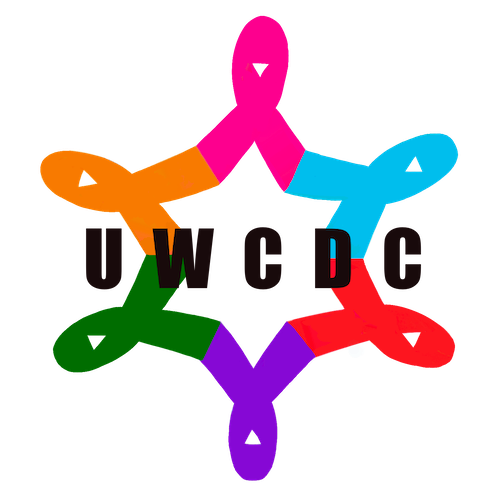
Starting a club at the very beginnings of a global pandemic was a daunting task, but for Ashley Kruchka and Samantha Morin, it was important. As students living with chronic disease, creating the UW Chronic Disease Club was the culmination of years of advocacy for themselves and their unique journeys at the University. Morin and Kruchka wanted to create a place for other students with Chronic disease to come together in both support but also awareness raising of both the different paths students have to take, as well as the supports available. “I wanted to do something,” said Samantha. “I wanted to meet other people who were going through the same thing. I wanted to feel less alone.”
The club creates a community that connects students and creates an understanding of the common issues students with chronic disease face while navigating university. Many of these students are in the unique position of “having a constant need to tend to health throughout their university careers, while also pursuing their other life goals like completing their degrees, co-op terms, or other university opportunities”, said Ashley. Right now, the club is running virtual meetings which create a safe place for the club’s 40 members to connect and talk. Samantha mentioned that common concerns for students with chronic disease can be “accessing services and advocating for yourself at university”, noting that students with chronic disease sometimes have to miss a lot of class to deal with their health, citing hospital stays or symptoms like chronic fatigue that can be debilitating. “It can be embarrassing asking others for their class notes over and over again.”
Ashley and Samantha said that one way the club helps students with chronic disease is by raising awareness of the services available to them on campus. In particular, Accessibility Services is an important one. Ashley speaks glowingly of her experience with the service, noting that “Accessibility is the reason I’m still in University”. Samantha said that she herself and other students in the club were initially hesitant to reach out to the service because they didn’t feel like they would qualify, that their struggles weren’t somehow “enough”. “Don’t be ashamed to ask for help,” she says, “a disability is a disability, whether it is visible or not, temporary or permanent, and they are there to help you.”
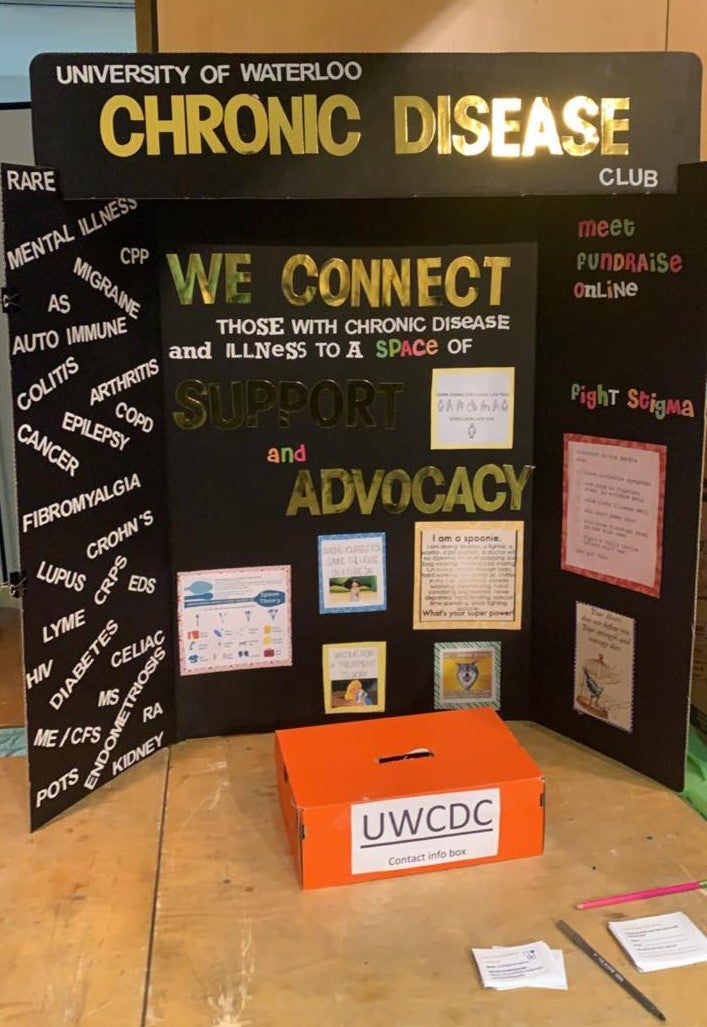
One bright spot of the pandemic for students with chronic disease has actually been the online delivery of classes. Ashley passionately talks about how online classes “can actually help students with chronic disease because the accessibility of attending class while experiencing physical or mental symptoms is easier. Many of our members have flourished and seen an improvement of grades during the pandemic.” While Ashley and Samantha acknowledge that classes will have to return to in-person delivery eventually, they are hopeful that some of the lessons learned from online learning will be paid forward into the new environment. Making video recordings of lectures available after class for example, can help students who might have to miss class for frequent doctor or hospital visits, and also students who struggle with learning disabilities who benefit from being able to rewatch the lecture at their own pace.
Both noted that the club represents a variety of chronic diseases and every individual has a spectrum of needs, but all the members can relate to the common feelings of navigating the university experience from a unique perspective with unique challenges. Samantha and Ashley shared that they hoped in the future the club could move into an active advocacy role and spoke about how many of their students must make sacrifices all the time. For example, some have to sacrifice their health to work or sacrifice their marks to take care of their health. Samantha and Ashley hope that in the future they can increase visibility for the need for more campus related funding, such as bursaries, food support systems, and health and medical expense funding. “It can’t just be the provision of health care that we’re focused on, there needs to be a focus the encompasses the full spectrum of the social determinants of health.” Ashley says.
If you’d like to learn more about the UW Chronic Disease Club, visit their Instagram account.
A stitch in time
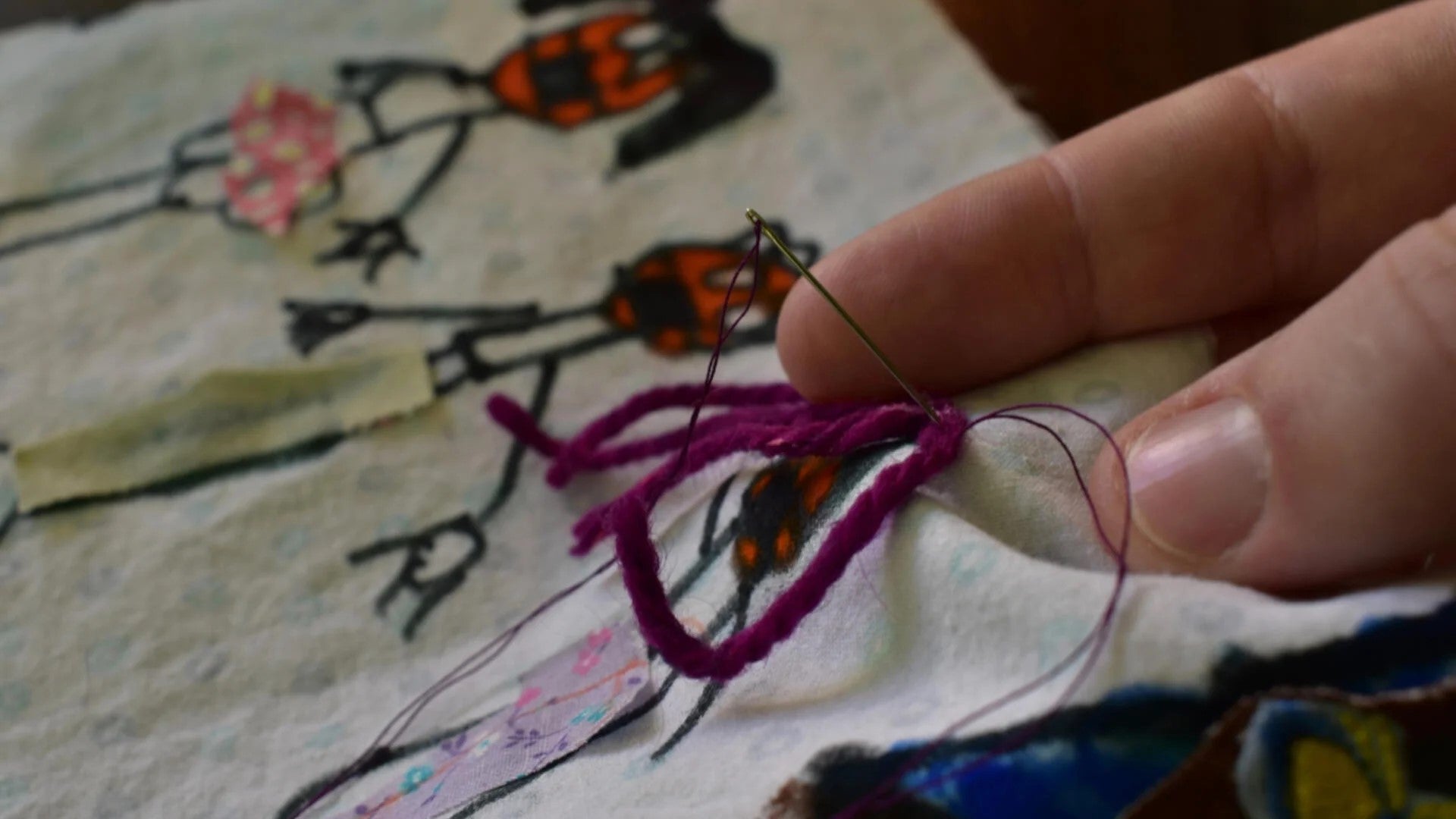
By Carol Truemner. This article was originally published on Waterloo News.
It was the COVID-19 messages and symbols Brenda Reid saw throughout her Kitchener neighbourhood a year ago that inspired her community-quilt project for people to share virus stories.
The Waterloo architecture master’s candidate, who was researching the topic of care in architecture for her thesis when the pandemic struck in March 2020, created the From Behind the Mask initiative for people living in Kitchener, Waterloo and Cambridge.
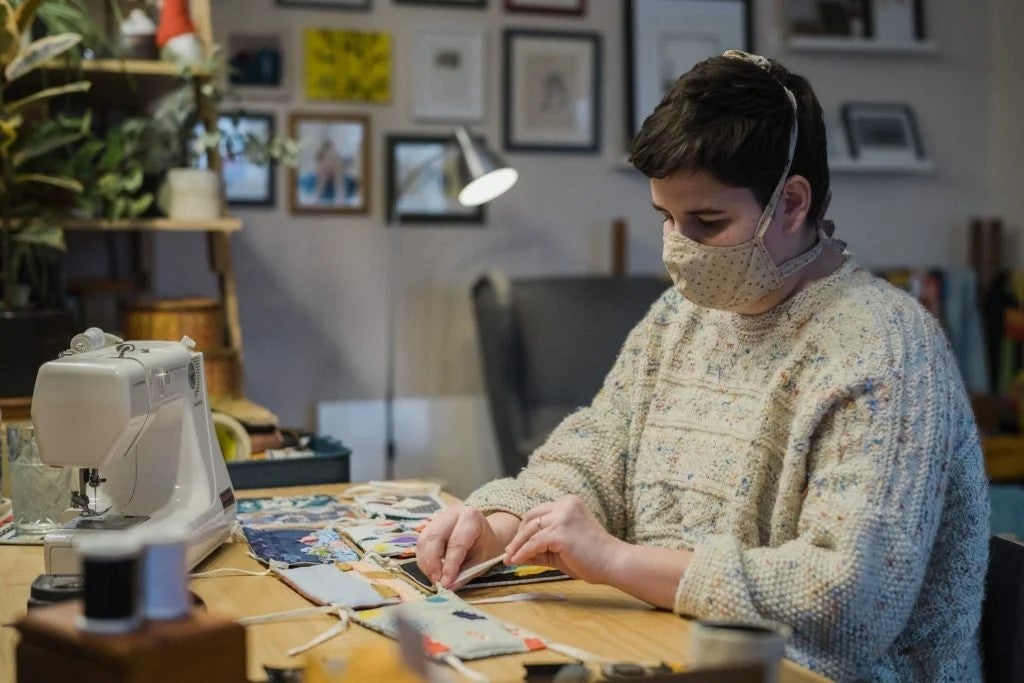
Architecture grad student Brenda Reid ties quilt blocks together. Photo courtesy of Erik O'Neil.
“What caught my attention on my neighborhood walks were the ways people used space to communicate with each other — from sidewalk chalk to ribbons on trees to signs on lawns,” Reid says. “I wanted to capture individuals’ COVID experiences in a permanent way.”
Since launching From Behind the Mask in October 2020, Reid has distributed 1,500 quilt-block kits she assembled with the help of volunteers. So far, she has received over 400 completed designs on pieces of fabric resembling face masks with more expected before the April 30 deadline.
When she started her project, Reid, a graduate of Waterloo’s undergraduate architecture program, was conscious that people were having very different experiences in the pandemic.
“What I received back was really that,” she says. “I surprised even myself with the variety and the subject matter of the blocks. Everyone’s story is important and valuable and that’s what this quilt is really about.”

Six of the over 400 blocks submitted for the community quilt.
No sewing expertise required
Individuals from three to 89 years old have submitted blocks in at least four different languages using a wide variety of mediums from traditional types of fabric to paint, crayon, yarn and beads. Most have the contributor’s name and a description of the block’s meaning on the reverse side.
Schools across Waterloo Region have been involved in the project with many using From Behind the Mask as a classroom art project.
Some of the blocks returned to Reid highlight specific activities including making sourdough bread, a popular pastime particularly at the beginning of the pandemic, responding to widespread shortages of yeast. A piece of yellow towel was used for the loaf with the embroidered words Mmm, Mmm Good beside it.
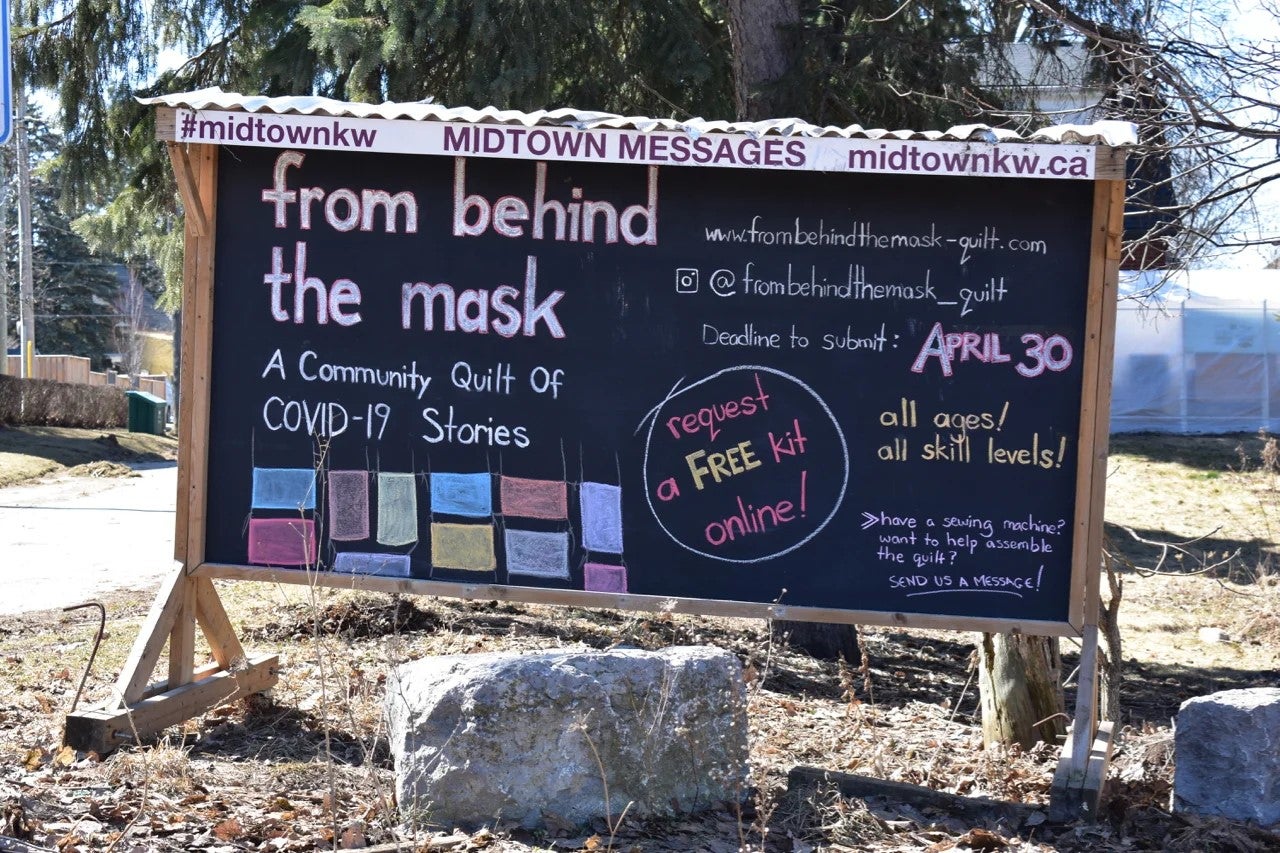
A message board promotes the project.
Another features three deaths and three births that all took place in 2020.
“It sort of talks about the cycle of life — that’s a lot of loss and a lot of new life in such a short period of time,” Reid says.
A 14-year-old designed their block into a fabric storybook.
“It tells a story about how they have really begun to enjoy reading during the pandemic and that it has become their source of entertainment,” she says. “They listed a whole bunch of books that they’ve read. I thought that was so cool.”
Currently, a team of volunteers from Kitchener’s Volunteer Action Centre and elsewhere are assembling the blocks, which will then be tied into the quilt. The finished work of art will be on display from May 21 to August 29 at the Homer Watson House & Gallery located on Old Mill Road in Kitchener.
“We’ll work out ways to film or photograph it so people who don’t get to see it in person will be able to see it online,” says Reid. “The hope is that the quilt will be set up in different locations throughout the tri-cities before being finding a permanent home in the area.”
Read the rest of the article on Waterloo News
Concluding a week of volunteer celebration
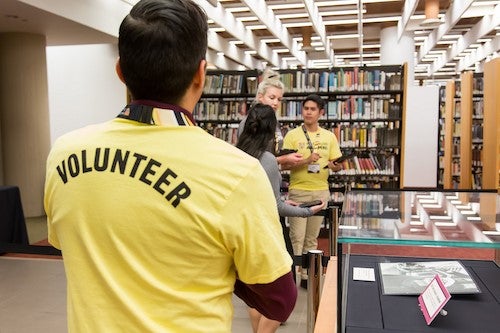
A message from the Office of Advancement.
Another National Volunteer Week has come to an end. Colleagues across Advancement spent the week reflecting on the amazing impact our volunteers have on the University community.
We celebrated with stories across our campuses, faculties and affiliated and federated institutions, sharing the many ways our volunteers embody this year’s National Volunteer Week theme: “The Value of One, the Power of Many.” Over the past year, more than 1,600 volunteers supported Advancement initiatives, giving back more than 11,200 hours of their time. Their contributions are truly inspiring. Thank you those who recognized their volunteers, both publicly and privately, as well as those who volunteer their time to the greater community.
With just two days left in this celebratory week, we invite you to visit the Office of Advancement LinkedIn, Twitter, Facebook or Instagram (@uwaterlooalumni), see how volunteers are making a difference. If you’re feeling inspired, check out our available advancement volunteer opportunities.
Beyond the Bulletin Episode 85

The latest episode of the Beyond the Bulletin Podcast is now live. The Indigenous Entrepreneurship Training Program out of St. Paul’s Greenhouse strives to bring increased prosperity and employment opportunities to Indigenous communities. Student Kyra Lindsey and Jacob Crane, the manager of the program, discuss the needed and worthwhile initiative. Submit a tribute to Feridun Hamdullahpur on the Decade of Impact website to recognize his 10 years leading the University. A new program of work-integrated learning, WE Accelerate, picks up speed. And the schedule for the virtual University of Waterloo Teaching and Learning Conference is now available online.
Link of the day
When and Where to get support
Students can visit the Student Success Office online for supports including academic development, international student resources, leadership development, exchange and study abroad, and opportunities to get involved.
Instructors can visit the Keep Learning website to get support on adapting their teaching and learning plans for an online environment.
Course templates are available within your course in LEARN to help you build and edit your content and assignment pages quickly.
The following workshops, webinars, and events are offered by the KL team (CTE, CEL, ITMS, LIB):
- Independent Remote Course Design Essentials, self-directed, continuous self-enrollment course in LEARN.
- Remote Teaching Support Drop-In, weeks of April 26th and May 3rd
- Getting Ready to Facilitate Online Courses: TA Training, beginning Monday, May 3
- LEARN for TAs (CTE6550), Wednesday, May 5, 10:00 a.m. to 11:30 a.m.
- LEARN for TAs (CTE6550), Tuesday, May 18, 1:30 p.m. to 3:00 p.m.
Employees can access resources to help them work remotely, including managing University records and privacy of personal information. Here are some tips for staying healthy while working from home.
Stay informed about COVID cases on campus by consulting the COVID case tracker.
Whether you’re a student or faculty member, the Writing and Communication Centrehas virtual services and programs to help you with all of your academic writing needs. This term we have added evening and weekend one-to-one appointments with our peer tutors, and our NEW one-to-one workshops, where you can learn the content directly from one of our writing advisors.
- Undergraduates: Work with us to brainstorm, draft, revise, and polish your assignments in one-to-one appointments. Ask questions and learn writing tips at our Instagram Live Q&A sessions, and beat isolation while improving your writing skills at the weekly PJ-friendly writing groups.
- Graduates: Meet with our advisors in one-to-one appointments. Join the online writing community at the Virtual Writing Cafés, learn how to present your work at Speak Like a Scholar, or get moving on your dissertation at Dissertation Boot Camp.
- Faculty and Instructors: Request custom workshops for your courses, join the Waterloo writing community at the Virtual Writing Cafés, or make progress on your article, book, or chapter in one-to-one meetings with our faculty specialist.
Co-op students can get help finding a job and find supports to successfully work remotely, develop new skills, access wellness and career information, and contact a co-op or career advisor.
The Centre for Career Action assists undergraduates, graduate students, postdocs, staff, faculty, and alumni through navigating career services that are right for them. You can attend a one-on-one appointment or same day drop-in session at the CCA for assistance with cover letter writing, career planning and much more. You can also book an appointment online or visit our Live Chat to connect with our Client Support Team. The CCA is here to help you.
If you feel overwhelmed or anxious and need to talk to somebody, please contact the University’s Campus Wellness services, either Health Services or Counselling Services. You can also contact the University's Centre for Mental Health Research and Treatment. Good2Talk is a post-secondary student helpline available to all students.
The Library has published a resource guide on how to avoid information overload.
The Faculty Association of the University of Waterloo (FAUW) continues to advocate for its members. Check out the FAUW blog for more information.
The University of Waterloo Staff Association (UWSA) continues to advocate for its members. Check out the UWSA blog for more information.
The Indigenous Initiatives Office is a central hub that provides guidance, support, and resources to all Indigenous and non-Indigenous campus community members and oversees the university Indigenization strategy.
The Waterloo Indigenous Student Centre, based at St. Paul’s University College, provides support and resources for Indigenous students, and educational outreach programs for the broader community, including lectures, and events.
WUSA supports for students:
Peer support - MATES, Glow Centre, RAISE, Women’s Centre - Visit https://wusa.ca/peersupport to book an appointment
Bike Centre – Will be reopening soon.
Campus Response Team, ICSN, Off Campus Community and Co-op Connection all available online. Check https://wusa.ca for more details.
Food Support Service food hampers are currently available from the Turnkey Desk on weekdays from 7:30 a.m. to 7:00 p.m. in the Student Life Centre. If you have any questions please email us at foodsupport@wusa.ca.
Centre for Academic Policy Support - CAPS is here to assist Waterloo undergraduates throughout their experience in navigating academic policy in the instances of filing petitions, grievances and appeals. Please contact them at caps@wusa.ca. More information is available.
WUSA Commissioners who can help in a variety of areas that students may be experiencing during this time:
- Equity – equity@wusa.ca
- Co-op and Experiential Affairs – coop.affairs@wusa.ca
WUSA Student Legal Protection Program- Seeking legal counsel can be intimidating, especially if it’s your first time facing a legal issue. The legal assistance helpline provides quick access to legal advice in any area of law, including criminal. Just call 1-833-202-4571.
Empower Me is a confidential mental health and wellness service that connects students with qualified counsellors 24/7. They can be reached at 1-833-628-5589.
When and Where (but mostly when)
Healthy Warriors at Home (Online Fitness)
Drop-in to Warrior Virtual Study Halls on Wednesdays from 5:30 p.m. to 7:00 p.m. Come together in this virtual space to set goals and work independently or in groups each week.
Livestream Exercises for Waterloo staff: Join us for an energy boosting Bootcamp or a fast and effective Express Home Workout. Open to UW Staff and subsidized by the Staff Excellence Fund.
Renison English Language Institute continues to offer virtual events and workshops to help students practice their English language skills.
Warriors vs. Laurier Blood Donation Battle. Join your fellow Warriors, donate blood and help us win the Blood Battle against Laurier for a second year in a row. Set up a profile or add the PFL code: UNIV960995 to your account if you have a blood.ca account already. Questions? Contact WarriorsInfo@uwaterloo.ca.
NEW - Dissertation Boot Camp, Friday, April 23.
NEW - Virtual Writing Café, Friday, April 23, 9:00 a.m.
A Year of COVID-19: Disparities, Inequities, and Inequalities, the first in a three-part series, Friday, April 23, 1:00 p.m. to 3:00 p.m. Please register to receive a link to this online event.
Waterloo Philosophy Sharma Lecture: "Deepfakes, Deep Harms" presented by Regina Rini, Canada Research Chair in Philosophy of Moral and Social Cognition at York University, Friday, April 23 from 3:30 p.m. to 5:00 p.m. via WebEx.
Lectures in Catholic Experience presents Progressive or Conservative? Archbishop Pocock and the Renewal of the Church in Canada featuring Peter Meehan, St. Jerome's University's President and Vice Chancellor, Friday, April 23, 7:30 p.m. online.
Women in Computer Science, Responding to Everyday Bias: How to Recognize it and Interrupt it, Monday, April 26, 12 noon. All are welcome to attend, but registration is required.
Bibliometrics and Research Impact Community Conference, Tuesday, April 27 to Thursday, April 29, 11:00 a.m. to 4:30 p.m. Register for this online event.
NEW - Copyright and Software, Friday, April 30, 1:00 p.m. to 2:30 p.m. Please register to receive a link to this event on WebEx.
NEW - Rupi Kaur Live, Friday, April 30, 9:00 p.m.
NEW - English Conversation Circles, Monday, May 3.
NEW - Dissertation Boot Camp, Friday, May 7.
PhD oral defences
Global Governance. Justine Salam, "Analyzing Major Royalty Debates in Alberta’s Oil Sands: Corporate Power at Play in a Subnational Resource-Cursed Petrostate." Supervisor, Angela Carter. Thesis available upon request from the Faculty of Arts, Graduate Studies and Research Officer. Oral defence Monday, May 3, 10:00 a.m.
Statistics and Actuarial Science. Ou Dang, "Efficient Nested Simulation of Tail Risk Measures for Variable Annuities." Supervisors, Mary Hardy and Ming Bin Feng. Thesis available from MGO - mgo@uwaterloo.ca. Oral defence Monday, May 10, 10:00 a.m.
Applied Mathematics. Richard Lopp, "Light-Matter Interaction Models in Relativistic Quantum Information." Supervisor, Eduardo Martin-Martinez. Thesis available from MGO - mgo@uwaterloo.ca. Oral defence Wednesday, May 12, 10:00 a.m.
Kinesiology. Michael Paris, "Characterizing site-specific body composition of older adults and their associations with strength, functional capacity, and metabolic health." Supervisor, Marina Mourtzakis. On display in the Faculty of Health (BMH 3110). Oral defence Tuesday, May 18, 9:00 a.m.